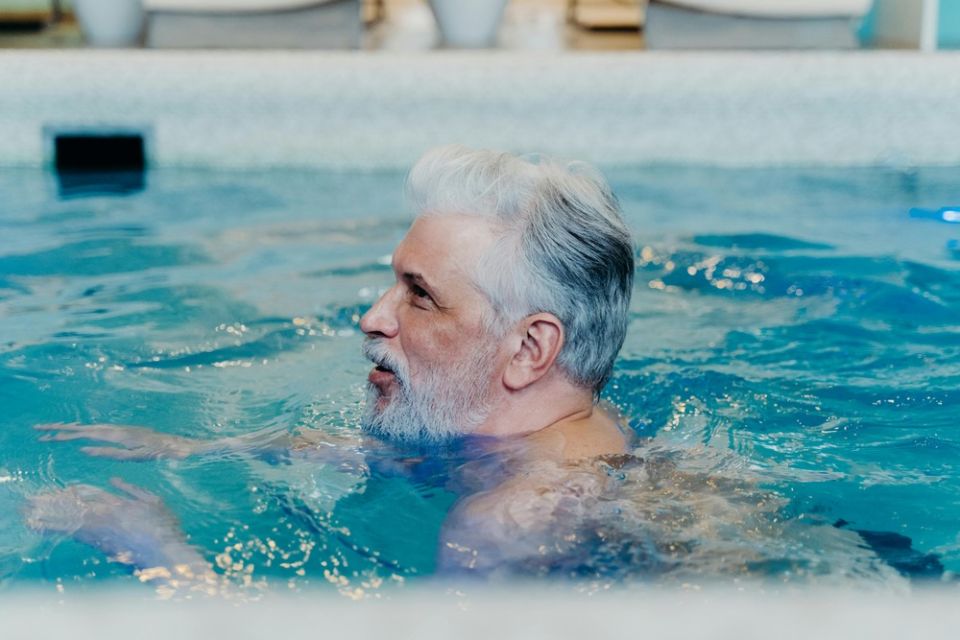How Swimming Slows Down Ageing
01/22/2024 | Written by Nikos Kaskaras in Adults
It's no secret. One of the biggest worries for most people is the ageing factor. No wonder, because time never stops. Although nothing can stop time, there are activities that can influence its effects. Swimming is certainly one of them.
How Swimming Makes you Look Young
The concept of time has numerous implications that apply to most sciences: From philosophy to medicine, the correlation between the passage of time and the changes it naturally brings has been the subject of countless writings and debates. This is also evident in the field of art: From cartoon heroes who never age to fictional characters like Dorian Gray (from Oscar Wilde's novel "The Picture of Dorian Gray"), the narrative of the never-aging character is intertemporal.
In this context, mankind has searched through the ages for the best means to limit the consequences of time. Why is swimming such a good activity for slowing down ageing and looking young?
- It increases muscle mass
- It improves lung function
- It rejuvenates the skin
- It is an excellent way to exercise the whole body
- It lowers blood pressure
- Improves cardiovascular health
The above are just some of the great benefits of swimming for keeping young.
The Benefits of Swimming for Longevity
In fact, the University of Indiana uses a better term than "keeping young": "Optimal ageing" are the two words its researchers used in a long-term study they conducted. Specifically, the study found that swimmers over the age of 35 who swam 3,200 to 4,500 metres three to five times a week postponed the ageing process. Swimming is therefore not only ideal for achieving longevity, but also for maintaining good physical condition and a high level of well-being. The words of Joel Stager, director of the University of Indiana's Councilman Center for the Science of Swimming, are to the point:
“We're starting to find out that a lot of the decline is probably related to a decline in activity rather than aging per se. The health and well-being benefits start with a minimal amount of swimming. If you want the fitness effect, you'll need to look at getting your heart rate up and boosting the intensity.”
These are solid scientific arguments that are actually confirmed in the pool: People who swim regularly and consistently tend to increase the volume of their swim training over time!
How Swimming Improves Cardiovascular Health
There's a critical statistic that we all need to pay attention to: 90% of all heart disease is preventable. There are three main preventative measures:
- Eat a healthier diet
- Not smoking
- Regular exercise
When it comes to regular exercise, it is an undisputed fact that swimming is one of the best and most heart healthy exercises. Swimming for 30 minutes a day can work wonders for your heart health and provide the following benefits
- Lower blood pressure
- Improve circulation
- Increase good cholesterol levels
- Reduce stress
- Keep weight under control by burning a lot of calories
The entire medical community recommends swimming as a great activity for maintaining a healthy heart and promoting a fulfilling lifestyle.
How Swimming Protects your Joints
We would like to highlight an important aspect of our discussion: Although most people tend to focus on anti-ageing practices in their mature years, this should not be the case. Starting swimming lessons and maintaining a healthy lifestyle from an early age is the best way to stay on track and minimise the effects of ageing. However, when it comes to seniors who want a healthy daily routine and regular exercise, there's no better choice than swimming. And why is that?
Because swimming is the most suitable and least strenuous activity for older people. In fact, it's the most joint-friendly exercise, allowing the body to move smoothly and easily. Because of the buoyancy of the water, swimming reduces the risk of aggravating existing conditions or causing new injuries. Movement in water takes the pressure off the joints and exercises the whole body. Swimming is therefore an important factor in keeping joints healthy.
How Swimming Reduces Stress
When it comes to slowing down ageing, stress is perhaps the most important factor. In fact, stress can have a devastating effect on health and accelerate ageing. Extensive research suggests that chronic stress can lead to accelerated ageing. In fact, reducing and controlling stress is such an important aspect of everyone's health, regardless of any other factors. With this in mind, swimming is an important anti-stress activity for people of all ages.
Anyone with the slightest experience of swimming can attest to this: As soon as you enter the pool or the sea, feel the softness of the water around your body and start to move your body in the water, all your worries seem to disappear. Again, there's a scientific explanation for why swimming reduces stress:
- Swimming releases endorphins.
- Swimming works your whole body
- Swimming makes you feel relaxed
- Swimming improves mental wellbeing
As for that last section, mental wellbeing, there's an amazing example of a young woman with symptoms of major depressive disorder who managed to get better by swimming regularly in cold open water.
So swim, people, swim. Swim for joy, swim for longevity!